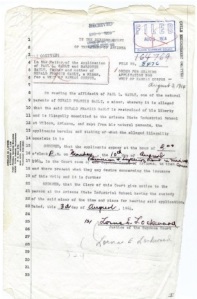
An adult Gerald Gault and his attorney Amelia Lewis.
The 50th anniversary of the landmark decision In Re Gault will be the focus of a May 15 event in Phoenix, sponsored by ALWAYS—Arizona Legal Women and Youth Services. The evening next Monday will include a reception and dramatic performance by Rising Youth Theatre.
Gault is the U.S. Supreme Court decision based on an Arizona case that ensured the right to a lawyer for children accused of crimes in juvenile court. More specifically, it held that “juveniles accused of crimes in a delinquency proceeding must be afforded many of the same due process rights as adults, such as the right to timely notification of the charges, the right to confront witnesses, the right against self-incrimination, and the right to counsel.”

That evening, ALWAYS also will “honor the leadership behind the Youth Collaborative in Maricopa County with the 2017 Youth and Justice Award.”
- When: Monday, May 15, 2017
- Time: 5:00 p.m. – 7:00 p.m.
- Where: University of Arizona College of Medicine – Phoenix Campus
 Address (see map below):
Address (see map below):
Virginia Piper Auditorium, 600 E. Van Buren St., Phoenix, AZ 85004
Free tickets are available here.
In Arizona Attorney Magazine, we covered the Gault anniversary in our May issue. Start reading here.
Here is an article by Judge Peter Cahill and Sarah Edwards.
Here is an article by Judge Jay Blitzman.

Gault order by Justice Lorna Lockwood for habeas hearing (click to enlarge)
And here is more information about ALWAYS:
Arizona Legal Women and Youth Services is a nonprofit law office committed to opening the doors of justice for youth and young adults who have experienced homelessness, human trafficking, abuse, or the foster care system. We are attorneys, advocates, and volunteers working together to eliminate legal barriers to success and stability for vulnerable young people in Arizona. We believe every person deserves full access to the justice system, and we work every day to make this a reality for vulnerable youth in Arizona. We provide no-cost legal services to support the safety, stability, and self-sufficiency of our clients. ALWAYS services include full representation, consultations and brief advice, training, and system reform advocacy.
Map to the event:





















